#Manual Mathematics
Explore tagged Tumblr posts
Text
The Art of Origami: A Journey Through History, Use, and Mastery
In this series, we have been looking at various types of art as art forms. We have visited collage, multi-media art, Mexican Folk Art, ATC’s, Japanese Kintsugi, Street Art and Murals, pottery, Chinese Kites, and now Origami. Wow! That’s a lot of art. I hope you have been following and have enjoyed learning about these different types of art around the world. Origami, the traditional Japanese…

View On WordPress
#artistic expression#Creative Origami#Foldable Structures#Japanese art#Learning Origami#Origami#Origami and Mathematics#Origami Designs#Origami for Beginners#Origami History#Origami in Education#Origami in Engineering#Origami Manual#Origami Symbolism#Origami Techniques#Origami Therapy#Origami Tutorials#Paper Folding#Senbazuru Orikata#Traditional Origami
3 notes
·
View notes
Text
Pilots are just like that
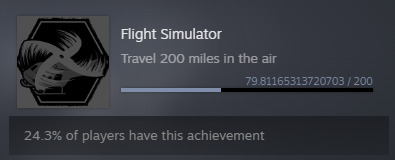

why would you ever need to track it this precisely
#I'm honestly not even joking#pilots virtual and real tend to be extremely precision and mathematically oriented because so much of successful flying IS math#if you ever get your hands on aviation training manuals it is all physics and commercial pilots are calculating gas and speed and altitudes#fascinating stuff though kinda sad I didn't get my license but also lol holy shit pilots get no money for the work they do school debt#there's probably a tism powered pilot with optimal helicopter routes in Just Cause even
1K notes
·
View notes
Text
oh what i do for my dear cube

#mathematics#i like linear algebra :)#3d rotation matrix#i mean like THE 3d rotation matrix#bc i haven't done much manual matrix mult recently i fucked up the first time and got a matrix with equations that were#just along the identity#and then i actually refreshed my memory and went ;-; lmao#that's what the little note on page 2 is#linear algebra
1 note
·
View note
Text
Americanisms that annoy the crap out of me in writing
By Writerthreads
Welcome back to another post! Today is a little rant/PSA for all of you who use American English and terminology.
When I read books that are meant to portray British characters, I get so annoyed when I read jarring Americanisms. Here’s a list of them that are especially annoying (I’m sorry):
“Pants”
Pants = underwear. Every time I read something on Ao3 along the lines of “Harry spilled a cup of tea on his pants” I immediately think of him drinking said tea in his undies which is absolutely hilarious.
Somebody who can’t afford to go to the GP/hospital??
Hello, we have the NHS which is free at the point delivery!!! #rare uk w
I had to fully stop reading a fic when a British character couldn’t afford medical care and that was a whole plot-line.
As a medical student, this scenario is fully bizarre for me to comprehend. The only situation in which someone wouldn’t seem medical attention from my pov is if they don’t want to wait for hours at the A&E
Chips/crisps/fries omfg
Chips= the fatter ones you get with fish and chips

Crisps: potato chips
Fries: the thinner ones from Maccies
Cookies vs biscuits
To this day, I still don’t fully get the cookie/biscuit thing but according to my British friends who get annoyed when I mix them up, biscuits are meant to be crunchier (eg. Chocolate digestives & jammie joggers), while cookies are softer, eg. chocolate chip cookies
Biscuits covered in gravy????
What is that. That is not a thing. The UK equivalent would be a scone (sweet, eaten with jam and clotted cream or smth like that and which one goes first is a whole debacle) or a Yorkshire pudding.
Accent/slang
Different people from different areas in the UK speak differently & have different vernacular. When who’s meant to be posh speaks in roadman talk, it’s the funniest thing ever, so please do research carefully!
Takeout
Unfortunately I do say this quite a bit, but people are saying this more in the UK now imo. Takeaway is the preferred term.
Fall
“It’s fall because the leaves fall form the treeeeees” no bro it’s autumn. I grimace every time I read this in a book set in the UK.
I could care less
Ok, then care less? It’s I couldn’t care less, which makes more sense anyways.
Fanny pack
Fannies mean something else in the UK lol. It’s a bum bag, but this term is used more now maybe?
Freshman year? College? Frats? Spring break?
We have a different education system :) uni is three years usually, colleges are halls at uni or sixth form colleges
Little annoyances:
Math: It’s maths. Mathematics.
Vacation: holiday (more interchangeable now tho)
“Line up”: “QUEUE up”
On accident: by accident
Trunk/hood: boot/bonnet (I do a weird mix and say boot/hood, my bad lol)
I drive stick vs I drive manual (learnt this from my ex). Most people in the UK (and Europe) drive manual because it’s supposedly superior
Movie: film (more interchangeable now)
Principal: headmaster/mistress
There’s probably a longer list somewhere…
Thank you for bearing with me. My friends are now subject to me saying ‘trousers’ every time they say ‘pants’, I can’t help it (help I’m getting colonised)
Also look up slang (esp slang from certain parts of London, or roadman slang), they’re hilarious and I can’t help but say some of them now (I blame my friends but honestly calling a meal a scran is so funny)
Anyways goodbye
#writing#writing tips#writers on tumblr#writing advice#creative writing#teen writer#writers block#writeblr#writers#british things#english#i’m sorry for this#but I do get annoyed sometimes and I have to go on reddit to get validated by proper British people getting proper annoyed
269 notes
·
View notes
Text

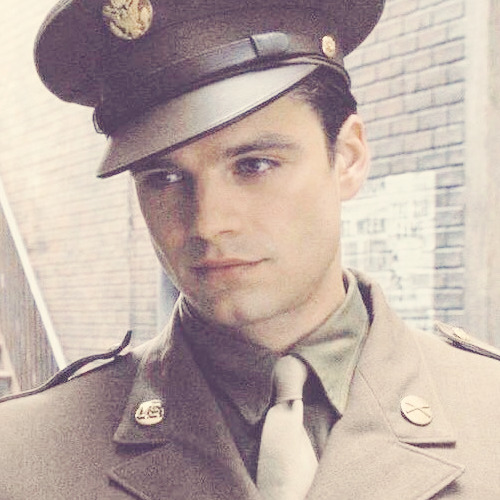

TIMELESS.
PAIRING — bucky barnes x time traveller f!reader
CONTENTS — one-shot; references to non-graphic violence; mild sexual content; star-crossed lovers; angst; minimal fluff; time travel.
SUMMARY — You've been lost for as long as you can remember, jumping from year to year, from time to time. You can never stay long, unable to control when or where you land. One day, after being suddenly propelled into the turbulent 1940s in America, you meet Bucky Barnes—handsome, charming, and, unbeknownst to either of you, doomed.
WORD COUNT — 3.0k
✩ masterlist ✩ library blog

It was always a little bit frightening when it happened; the ground beneath you disappeared, leaving you with that sick feeling of your stomach falling, your vision obscured by a blinding light and swirling colours.
Even when you land on your feet once more, it takes you a few moments to orient yourself. You stumble on wobbly legs, reaching out a hand for anything to steady you. Your hands finally come into contact with something solid, the bite of mortar and brick rough under your palms.
You slump against the wall, chest heaving with exhaustion. You had just finally grown used to life in ancient Greece, after having spent nearly two months there.
It was a relatively easy existence back then: philosophers asking questions about the meaning of life; astronomers gazing up at the stars to figure out if they could find some sort of logic in the random and messy arrangements of outer space; scholars making advancements in mathematics and medicine.
It was idyllic, but a part of you was glad you leapt right on time to skip through the inevitable fall of that society.
To say that you’re the one who decided when and where to leap would be misleading, however. It was more like some other power was pulling you through the space-time continuum and you could never stop it, no matter how hard you’d tried. You’ve spent centuries trying to learn the intricacies of your gift, but there was no manual, no instruction book, no how-to guide.
And you had never come across anyone with the same gift in all your years. Time travel, no matter how often you did it, remains a mystery.
Once you’ve caught your breath, you look around and find yourself standing in a deserted alley, still dressed in your tunic and toga. It’s much colder than you’d grown used to, little flakes of snow drifting towards the ground, disappearing just as quickly as they appear. You haven’t seen snow in a very long time indeed.
Not caring that, to any passersby, you look like a crazed lunatic, you grab the first person who passes when you emerge from the alley. Still accustomed to using the Grecian tongue, you asked, “τι χρονιά είναι?”
When the man looks at you like you’ve grown a second head, you try again. English, this time. A bit more universal. “What year is it?”
1942 . America, judging by the man’s accent. You bite back a groan of disappointment, The last time you came to the United States, it was 2005 and then way back in 1624.
That means the passport and money you had stashed away in a remote location outside New York City in the future isn’t there yet; the money you hid in the 1600s was probably either long gone or now worthless.
You have no means of survival, meaning you have to depend on the kindness of strangers—it is not something you’ve come to expect from your fellow man; all of your time on Earth meant you know all of the atrocities that humans are capable of.
Luckily for you, or maybe unluckily, you can’t be killed. Sometimes, you are in the wrong place at the wrong time, caught the eye of or hitchhiked a ride from the wrong person. You would wake up hours later, after whatever misdeeds they had committed against you, your body showing no signs of trauma.
No, those would be hidden from view, carved deep into your bones, visible and accessible only to you.
You aren’t sure which is worse: the fact that you are forced to travel through time against your will without any warning, or the fact that, on top of that suck salad, you are immortal as well. A winning combination, surely. If you ever got to meet your maker, you swear they are in for such a pummelling.
The man you stopped shrugs your grip off his arm and leaves you, shivering and hopeless. You aren’t wearing shoes. Everything looks different; you can’t even be sure you’ve been to this city or town before. You don’t recognize any of your surroundings, but have no choice but to go exploring on bare foot.
Before you can take another step, however, a voice splits through the night air. You flinch, despite yourself. “Hey!”
You go to turn, hoping this person isn’t addressing you, but suddenly you are blanketed in warmth, shocking yet soothing. You look down just in time to see a brown jacket draped over your shoulders, two large hands are rubbing up and down your arms. You can’t find it in your self to protest, the warmth welcoming and your body already straining against exhaustion.
“Good god, what are you doing out here dressed like that, sweetheart? Steve! C'mere. Gimme your scarf!” Before you can say thank you, express your gratitude for even this small iota of generosity, your body gives out. Your knees buckle and you are pulled under, deep into a swirling void of darkness.
You wake in a strange apartment, lying in an unfamiliar bed, panicking. You kick the covers off so hard that a corner of it catches on a lamp at the other side of the room, knocking it over with a loud crash. The bedroom door flies open, and the first thing that catches your eye is blue.
Eyes unlike anything you’ve ever seen. You’ve lived hundreds, maybe thousands, of years and yet you are sure you will never again find eyes so beautiful, so expressive, such an icy shade of blue yet somehow so warm.
You should be apprehensive, at the very least, but there is something about this man that makes you feel safer than you’ve ever felt—something about him that makes you wonder, before this very moment, if you had ever been safe at all.
He rushes out to you, holding out his hands as if to catch you, but pauses just short of actually making contact. He sheepishly explains that you collapsed in the street, and he couldn’t just leave you there. You see his military uniform hanging from the door of his open closet, his draft papers sitting out on his dresser for all to see.
You feel a surge of sympathy, despite your own dire situation, but it’s nothing you’ve never been through before. For him, however? War? Unfortunately, it’s a story you know all too well. He will come back a changed man, in more ways than one.
But not even you could know just how right you would be.
“Is there anyone I can call for you, doll?” He asks, pulling your attention away from the bits and pieces of his life scattered all over his bedroom. You shake your head, because, no, you are all alone in this world — as well as in all the others.
He offers to take you to the women’s shelter just a few blocks away. You agree, but somehow, as the day trudges on, you find yourself reluctant to part ways.
He gives you a change of clothes, all of which belong to his best friend Steve Rogers, the one whose scarf you still wear, and takes you to a diner. He orders you a vanilla milkshake and a hot sandwich, tells you to call him Bucky, and slides into the booth next to you instead of across from you.
He doesn’t ask questions about where you’re from, about why you ended up on the streets of Brooklyn in nothing but a sheet, totally barefoot. Instead, he asks you questions like, “When did you last sing to yourself? What is your most treasured memory? Do you have a secret hunch as to how you will die?”
You answer him as honestly as you can, your lips itching to share your secret with him. Your life as a time traveler meant that you couldn’t afford to let anyone close, but it’s impossible not to let your guard down before his crooked smile and slicked back hair.
But, if you are just going to disappear in a matter of weeks, then what does it really matter? Soon, he will be shipped off towards the battlefields of Europe, too preoccupied with matters of life and death to even remember the likes of you.
So, you tell him.
He smiles at you as you sip on your milkshake, as if you haven’t just told him that you can live forever, that you’ve lived through various moments in time. His fingertips slide along the curve of your jaw, and he says, “So, one day, you’ll be gone,” he snaps his fingers. “Just like that? Without warning?”
“I’m afraid so.” You whisper shakily, eyes wet with tears. He doesn’t laugh in your face.
Can he tell you are tired of leaping?
He doesn’t pull back and call you crazy.
Can he tell you are tired of not belonging?
In fact, he comes even closer.
Bucky’s so close that you can feel his warm breath fanning across your cheeks, you can see each tiny specks of gold in his blue eyes.
“Well, what are we waiting for?”
Brooklyn 1942, inside a tiny diner with a flickering neon sign in the window. The location of your first kiss with one James Buchanan Barnes, as he leans forward and you swear he’s breathing his very soul into you.
It hasn’t been twelve hours since you first met him and you’re already stumbling backwards into his apartment, lips still attached in a passionate embrace. You could chalk it all up to a single night of intimacy, something you’d grown accustomed to whenever you traveled to a new timeline—you had needs, after all.
But there is something about the way he handles you, about the way he presses his hands flat against the small of your back, pulling you that much closer, even though there’s no more room left between you.
As if, now that he knows your secret, he wants to savour every last second.
You’ve had your fair share of lovers, but you have never made love quite like this. You fall back onto his bed once more, but this time he hovers over you. Bucky’s eyes search yours even as he undresses you, even as he straightens to pull his own shirt over his head. His eyes never leave yours even after you are joined together, fingers intertwining, like he’s trying to anchor you here.
Even long after the deed is done, Bucky never breaks eye contact.
You know then, as you bask in the afterglow of his embrace, that you are not only lost in time, you are lost in him.
This has to be why you’ve been wandering so aimlessly for so long: you were looking for him all along.
Out of all the sights you’ve seen, you decide that this is your favourite. Surrounded by the walls of his modest apartment, rays of moonlight peeking through the curtains, the smell of his cologne still fresh in your nostrils, and Bucky snoring away softly next to you, with one arm still curled around your waist.
But fate is a cruel mistress.
Because only two weeks later, the shortest you have ever spent in any timeline, Bucky walks into the bedroom with a tray of coffee and fresh croissants, only to find the bed empty. The only traces of you left is the lingering scent of his own shampoo, the one you had just used minutes earlier.
And because, if he were being honest, Bucky hadn’t really believed you until that very moment.

You jolt awake, hand reaching out into the darkness of a new apartment, but your fingers close around nothing. That dream again.
New York City. 2023.
For the rest of the world, it’s been eighty years since you last visited the city. For you, however, it’s been nearly five thousand.
For the longest time, you couldn’t tell if the man who visits your dreams — your nightmares? — was real. All you know is that his is the only face that sticks, no matter how many years have passed.
Every single time you leap, every single time you find yourself in a new time, you search for any signs of him.
You were sure he was a figment of your imagination. Maybe he was made up by your subconscious, something to cling onto in a life full of memories long gone — lost to time. That is, until you landed back in New York.
Bucky Barnes is real.
You would learn what happened to him after you vanished back in 1942. You would learn that, while you were transported further back in time into medieval Spain, Bucky lost an arm. Bucky was being forced into a chair, agony ripped from his throat. Bucky was being pulled out, and something else entirely crammed back in.
Bucky Barnes is alive.
He’s spent the better part of the last five years “blipped” away from existence. Before that, he was a wanted fugitive. Before that, a ghost story. Before that, a young boy who was sent into a war he didn’t sign up for. Now, blamed for actions that weren’t his own. You don’t know how long you wept for him.
But then, you realized, you’ve been weeping for him for five thousand years.
It was your plan to continue life without him, to disappear from this timeline just as unceremoniously as you arrived. But then six long months passed, the longest you’ve ever spent in any time period, and you saw him one day, just walking across the street.
Of course, he’s aged. He’s wearing a leather jacket, his hair cropped shorter, he stops to speak to an elderly Asian man and even from a distance you can hear his voice. Even after all these years, he sounds exactly like you had imagined remembered.
You have always hated what you were, but you’ve never loathed your own existence as much as you do then. You’d given your heart to a man you knew for two weeks, your mind struggling to hold onto him as millennia passed you by. You never thought you’d see his eyes again, hear his voice, breathe the same air. Conflicting emotions battle within you, tearing you apart between your desire to touch him, to hold him, and your longing for an end to this miserable existence.
But you don’t have time to decide. Bucky looks up and locks eyes with yours. They go wide as if he recognizes you, but when a bus stops in front of you, obscuring you from his view, you try to take the opportunity to disappear once more.
Whatever allowed him to survive these last few decades also allows him to find you easily. Before you can even round a corner and disappear down the crowded streets, his fingers are closing around your wrist and he yanks you back to face him. He’s not even out of breath, considering how fast he had to run in order to catch up to you in such a short amount of time.
“You’re real.” You hear him say, the exact same words you had whispered to nobody in particular when you opened a history book at the library and found black and white photos of him printed on the pages. “You’re real.”
You try to pull away. This is not a happy reunion. You know that there is only one way for this to end. You will remember what it’s like to love in a way that crosses time, realities, and universes.
You will then be ripped away from all of it, not knowing when you’ll be able to make it back, if ever, to see him again.
And even another five thousand years won’t enough to dull the pain of it a second time.
“Let go.”
He doesn’t. How can he? For eighty years, yours was the only other face that wouldn’t leave him, no matter how hard Hydra tried. They couldn’t erase Steve; they couldn’t erase you, either.
“Please. I remember you.” He says, like they aren’t the only thing in the world that matters. If you do ever die one day, you are sure that his name is engraved deep in your bones; you are sure that you have always been his, ever since you first appeared on this god forsaken planet.
He’s not the boy you met in 1942, but it is still impossible to refuse his bright blue eyes — still shining with hope even after all that’s happened — but he would tell you when you are once again safe within the walls of his home, that the light you saw in his eyes was just your reflection — just you.
You weep into his bare shoulder, mouth trembling with grief as he marks his existence deep into your soul, kisses unspoken promises onto your skin, and moves to whisper love between your lips.
“I’ll have to leave you again.” You breathe, trying to hold onto this memory so that, even if another five thousand years go by, you will never doubt his realness ever again.
“I know.” His voice is just as unsteady, stuttering as he moves against you. You hold him tighter, closer.
“I don’t want to go.”
“I know.” You feel his tears splash onto your cheeks, and you mourn with him. “I love you. I know that’s real. I love you.”
Love. It is simply not enough to describe what it is he makes you feel. But then you feel a familiar sickness in your stomach, a familiar dizziness that tells you your time is up. So you quickly say it back. The words are jumbled as you rush to tell him before it’s too late. You say it to each other over and over and over again, fingers closing and clenching in a reluctance to part, until suddenly—
He is alone once more. He weeps into his hands, lying in that bed for hours, maybe even days, even though he hasn’t slept in a bed in almost a century. He will lie there until he can no longer smell you on his sheets.
She is real.
She is real.
She is real.
fin.

© 2025 by thereoncewasagirlnamedjane. do not repost, translate, or copy to third party sites. no part of this work may be fed into any AI software or websites. minors are asked not to interact with my blog; you are responsible for your own media consumption. blank/ageless blogs will be blocked.
#bucky barnes x reader#bucky barnes x f!reader#bucky barnes x female reader#bucky barnes x you#bucky barnes x y/n#bucky barnes one shot#bucky barnes angst#bucky barnes fanfiction#bucky barnes x asian!reader
99 notes
·
View notes
Text
How obsessed and hyper-fixated are you with your fanfic characters?
Me:
BOOKBINDING!
Ominis and Phineas now sit on my shelf along with my other books ♡
This was my first time binding fanfic, and no better choice than my own, "Take Me To The Lakes" (AO3 / Wattpad)
update (March 30): New cover art by the amazing @rinthecap 🩵

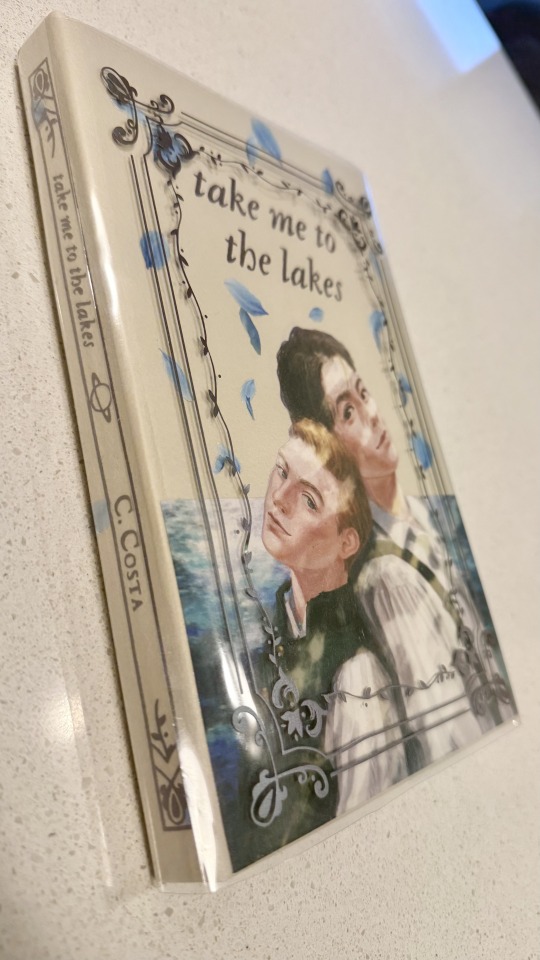
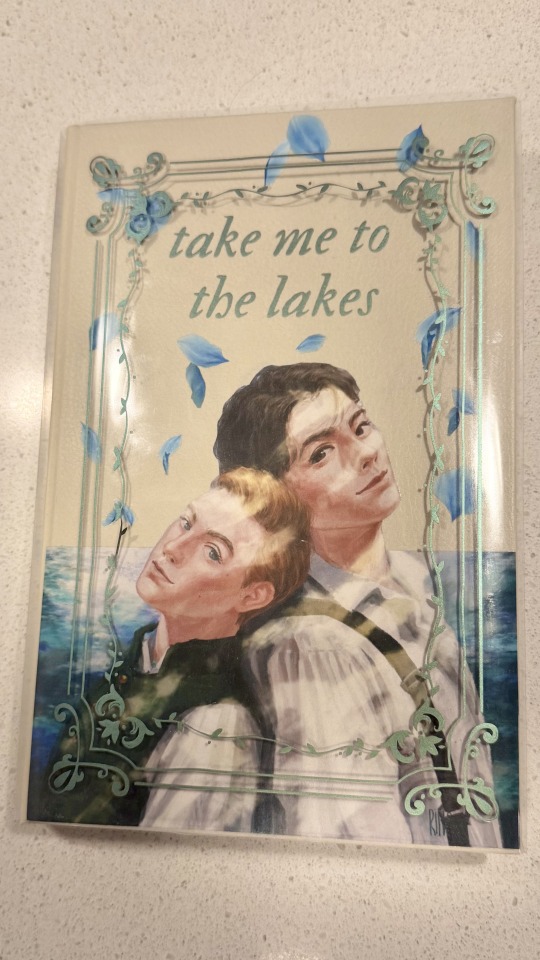
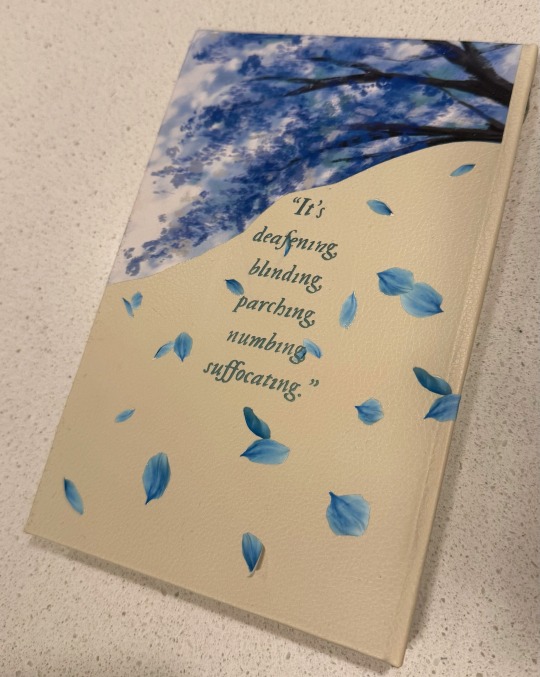
More photos and the step-by-step after the cut! (+ the appendix with Taylor Swift songs in a stylised lyric book)
I'm all about my crafty hobbies. I've been eyeing bookbinding for a while, and the algorithm finally convinced me to dive into it so I'd have a reason to procrastinate on writing
Having written a shorter fic ("Lakes" is roughly 35k words) gave me the perfect opportunity to start with something simpler.
The main tutorial used is the one by NeatFreakGeek on Tiktok.
Step 1: The typeset
I used the base template file by NeatFreakGeek, which already had the settings for printing in formatted book signatures.
With the basic body of the document formatted and ready, I started the personalization: choosing the fonts, spacing, sizing etc.
For the quote at the beginning, I chose one of the lines I wrote for Ominis + the wisteria.
For chapter headers, I chose the Gemini constellation. (In the story, Ominis and Phineas got their middle names from the stars in the same constellation, Castor and Pollux.)
I also made the chapter titles with the HTV to give it an extra glow.
Sight is overrated. Phineas makes all my senses the very essence of life itself.
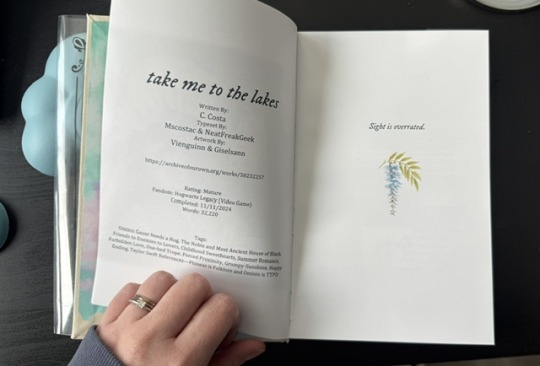
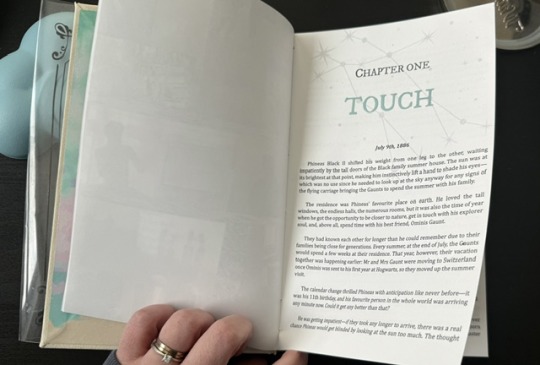
Since the story was rather "short", in order to have a thicker spine, I added an appendix with the stylised "lyric book". This was probably my favourite part of typesetting!

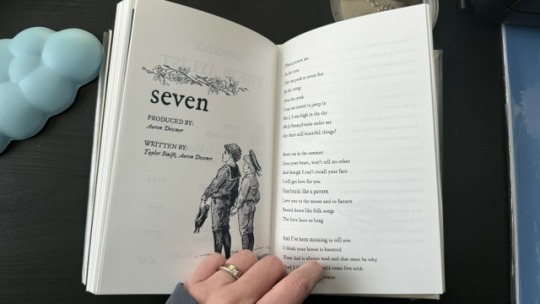
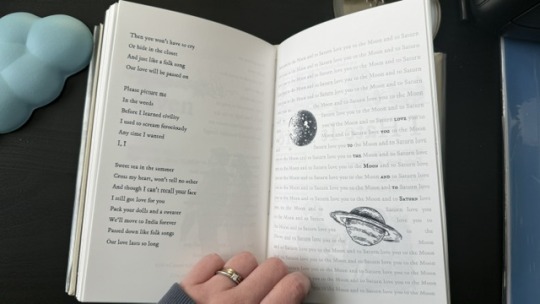
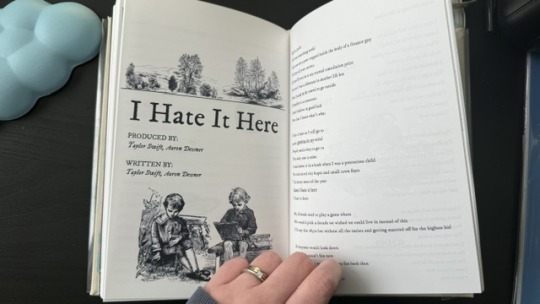
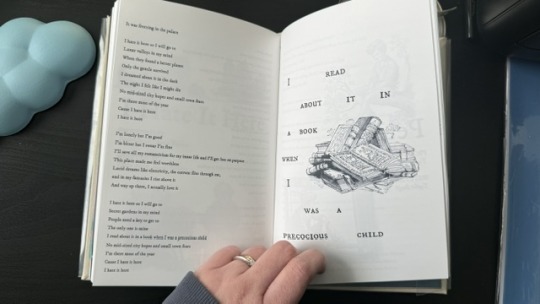
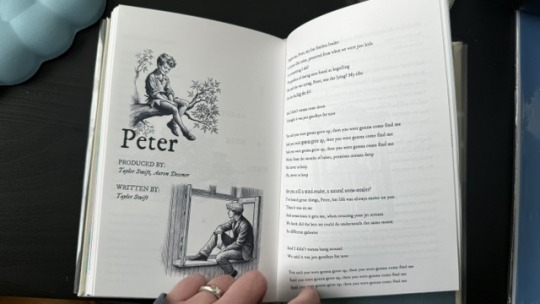
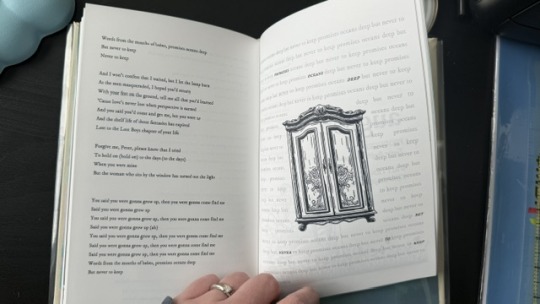
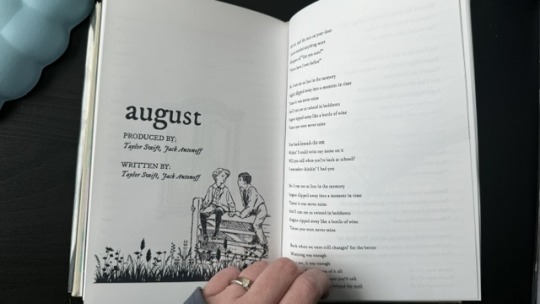
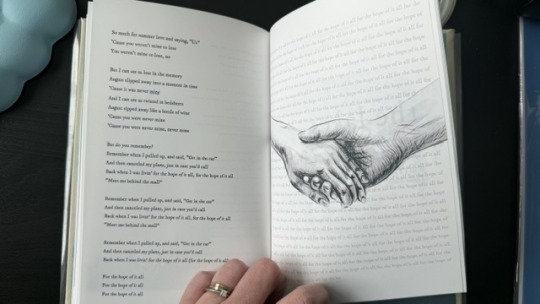
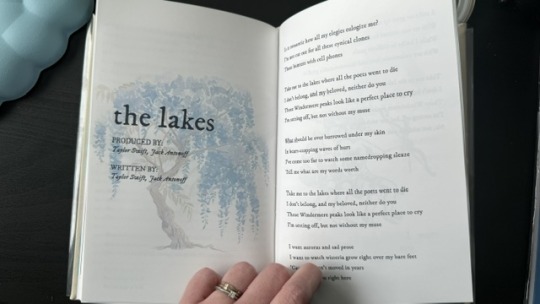
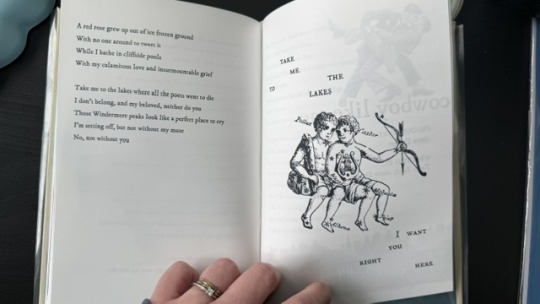
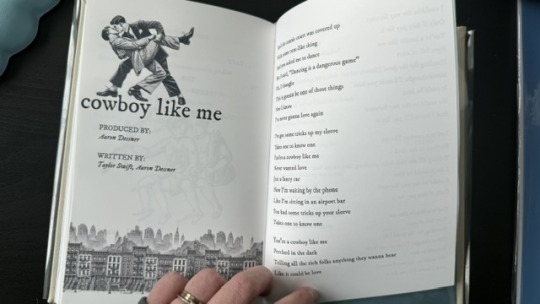
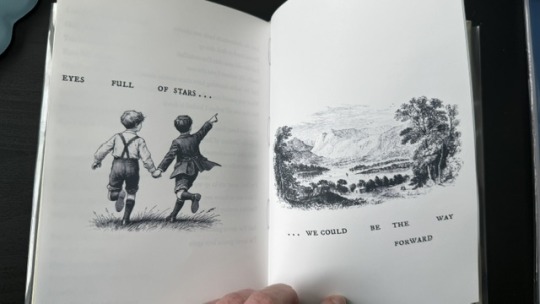
Step 2: The textblock
With a little lot of trial and error and more mathematics than expected, I printed each signature at a time, then folded each at a time, making sure it didn't get mixed up across the signatures. My printer does front/back automatically, but to print the commissioned arts as borderless, I gave myself a headache, printing it separately and manually. This step could have been done considerably faster with a laser printer and b&w content only :)
Next, it was sewing and glueing. I won't go into detail here because the video tutorials are way better at explaining. All in all, with the right tools, this was done rather easily and with barely any mistakes, so I didn't have to print anything again, thankfully.
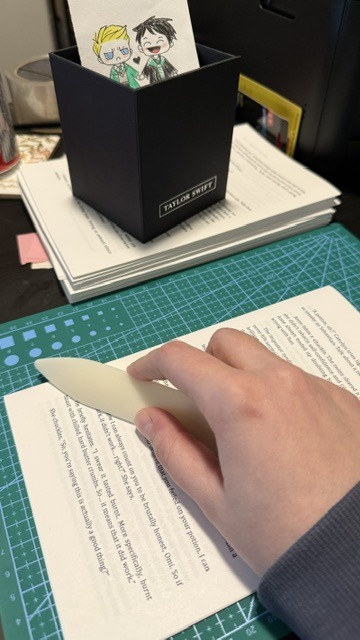
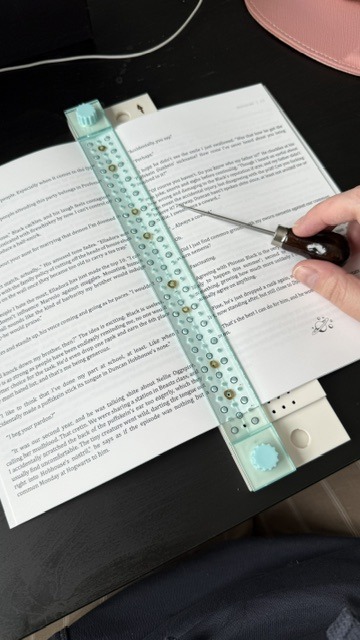
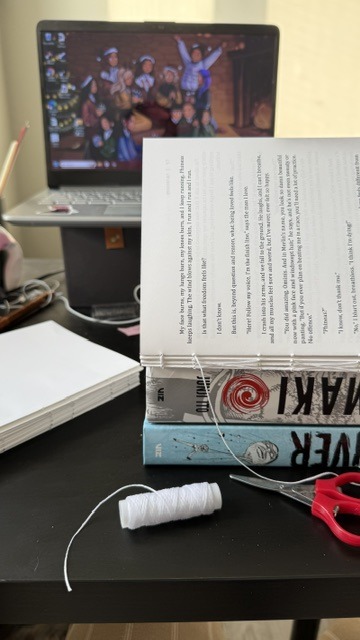
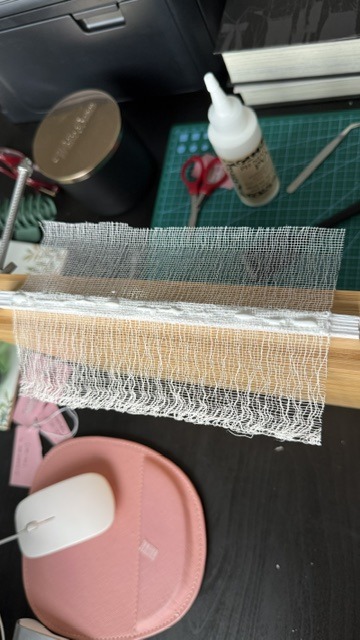
Step 3: The endpapers
I got a scrapbook 12x12in block in this abstract colours. I had many different ideas on how to match the theme, but I ended up choosing these colourful patterns that align with how Ominis perceives the world. Then, I added the quotes from the story.
The endpaper of the front got this sky-like print to go with the dialogue Ominis and Phineas have when they are children.
P: How would you know what blue skies look like? O: I don't know. And I don't mind not knowing.
The endpaper of the back is in green x blue shades, colours that are also a big part of the story. For the quote, I chose one of their last lines when their relationship is established.
P: Ominis, you always care too much about the others... but who takes care of you? O: No one ever did. P: Let me care for you. Please. Let me love you, Ominis Gaunt. O: Will it make any difference if I say no? P: Absolutely not. O: Will it make any difference if I love you back? P: Fucking absolutely yes.
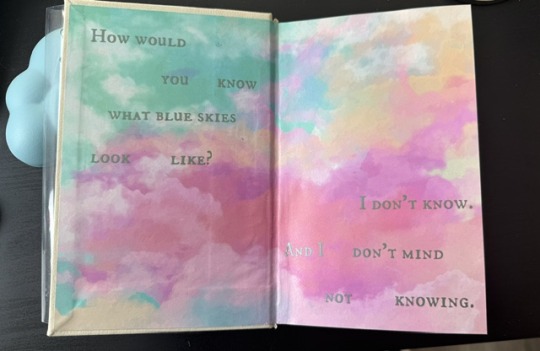

Step 4: The cover! (Yes, the most interesting part!)
This was the most challenging step in both the conception of the design (too many ideas to choose from) and the execution (I've never hated box cutters so much.)
With the basic cardboard casing cut and glued, I chose a faux leather material as a book cloth. This might be the choice I regret the most, because the glue it comes with is not that strong, so it would often unstick easily, and also, it's a bit too thick, leaving the corners a bit weird. But the final result was a bit worth it.
For the cover design, I printed the art with fabric HTV and ironed it on. On top of it, I threw in some wisteria petals (a reference to the song "the lakes", by Taylor Swift), and another quote of the story at the back.
I didn't have a cricut machine back then for the vynil pieces, so I ordered it online. This part was harder than I thought, once again because of the faux leather choice: as I ironed the HTV, some parts of the material melted lol.
Lastly, I decided last minute to create a clear dust jacket because the combination of the faux leather + printed HTV seemed tro fragile to be handled. I liked the final result, but ironing the HTV on the acetate was a pain lol.


In summary, this was so much fun and not as hard as I expected, craft-wise. The designing of it all took the most time just because I wanted every little detail to have a meaning :)
I made two copies to gift one to a friend, so it gave me the opportunity to make the first one and mess it up, then, for the second one, I had already learned from my mistakes.
There are many things I'd do differently for my next binds, but that's the most fun part: experimenting with materials, themes, and processes.
#I have a lot of free time#In crafts we trust#now I'm even more motivated to finish my other fics just so I can print them#my family asked for a copy now I don't know how to explain that I won't let them read my fic in a million years#hogwarts legacy#ominis gaunt#ominis gaunt fanfic#ominis x mmc#book binding#bookbinding#fanfic binding#gay fanfiction#gay#lgbtqia
74 notes
·
View notes
Text
Donatello's First Love—Splinter's Talk
mostly bayverse, could be 2003 if you squint hard enough. did it a little different with this one compared to the others :0 word count: 1.6k
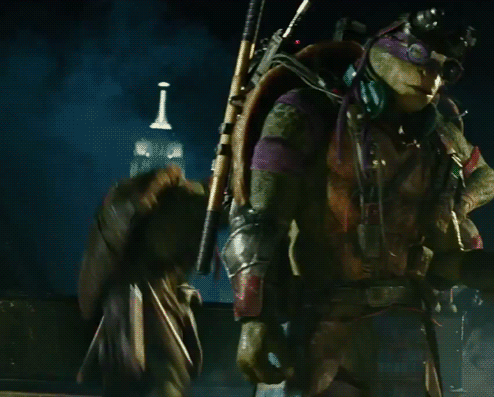
Spanning his messy corner of the Lair, Donnie's many monitors mounted to the wall were alight with a blue glow. The same few camera feeds rotated between the locations outside of their home and other places, monitoring, and allowing surveillance to take a backseat in his mind while he worked. At his desk, he gently squeezed a pipette into the mouth of a breaker, waiting for the reaction he was looking for to occur.
"Interesting," he mumbled to himself, "I wonder what happens if I were to supercool the mixture."
He placed the substance in a tray and prepared another batch, this time, much more concentrated. There wasn't much to do around the house besides experiment with the materials he'd salvaged. That was fine; he enjoyed the process, and filling notebooks—and his walls—to the brim with chemical equations, notes and mathematics that hardly anyone but he could read.
Careful with his large fingers to not drop the pipette, he sucked a few drops up from the test tube, going in to add to the mixture. He squinted, almost there. And then the startling alarm pinged on the screen next to him, making him jump and squirt the chemical on his work surface. He quickly wiped up and looked over at the computer. "'Motion detected: [y/n]'s apartment complex'," the screen read, switching camera feeds to one of the multiple tiny cameras he had set up. He only put cameras where he thought it mattered; he was paranoid about an ambush, and even more so at her place than theirs, now that she was coming and going from the Lair. The likelihood of their enemies finding out her association with them was about a fifty-seven percent chance, fifty percent too much for Donnie.
He scanned the monitor for signs of anything suspicious, but it turned out to be only a friend dropping by with a key to put a package inside, with [y/n]'s permission.
"Oh," he muttered, suddenly feeling silly. He made sure the person left her apartment—and locked it back—before quickly switching the feed. That was his one secret nobody had managed to catch him out on yet. Even so, he felt slick and a little guilty for spying. But, justifiably, they needed to know if she ever was in danger! He dismissed the notification and rotated the feeds manually. "Whoops. Sorry, [y/n]...yeah, I'll just switch that back."
He shuffled around to resume his work titrating. Except Splinter stood curiously behind the desk, eyes trained close on the monitors, and then Donnie. Donnie flinched—Splinter usually didn't come in or near his lab. In fact, none of his family normally bothered him when he had his nose in his work, because none of them understood it. Not even Leo bothered to try to get the details. The details went over their heads.
"So, Donatello, what is it you are working on?"
"Oh, Master Splinter," Donnie greeted him, glancing back to make sure the monitor was no longer on the door to her apartment. He picked up the pipette and test tube he'd knocked over before, "What is it?"
"Refer back to my last question," Splinter replied. He leaned calmly against his cane and looked all around the cluttered lab. Notes taped, tacked, even glued to walls. A whiteboard full of impossible equations, various pieces of technology in disrepair he'd picked up from trash and things going to recycling. Quite the mess, but Donnie knew where everything was. Splinter cocked his head slightly. "What disorganization," he commented.
"Disorganized to you," Donnie corrected with a smile, "but I can find anything I'm looking for—it's actually 'unorganized', implies that it never was organized. The definition of 'disorganized' suggests that something once was organized but now isn't, but I never once had this place in order," he rambled.
"Donatello," Splinter interrupted. Once his son got talking, it was hard to stop him. He just had to interject to get a word in. "What is it you are doing? You have been very unfocused lately. This is strange for you."
"Unfocused" was an understatement. With a mind already running miles per minute, he was getting caught up in his own head. Getting his work station back to a functional state, he set up his tube tray, answering, "Titrating these and writing out their chemical equations. The brain's like a muscle, gotta exercise it and stay sharp," he said. And with all that sharpness, he was only half-suspicious as to why Splinter was suddenly interested in what he was doing.
Splinter nodded. "Then I must not have seen miss [y/n]'s apartment complex on your screen. Carry on."
Donnie froze, watching Splinter out of the corner of his hazel eyes. His stomach dropped. So, it was one secret—they weren't going to understand, he was just as protective of their home, too! What if she couldn't call the police, or even them in time if someone broke in? Her apartment wasn't in a good area, Donatello already didn't like that. What if someone grabbed her? He couldn't put his mind at ease without knowing.
"I—well, this was a recent development, you see," Donatello stuttered, fidgeting with the purple wraps around his hands. He realized then how weird it all looked and panicked. He'd never meant for it to go this far; his cautionary measures just kept escalating more and more with his feelings for her. "I swear, it's just outside of her place! I would never put a camera in her apartment, that would be creepy, and way overstepping," he explained. "I told her I'd always look out for her and that she can count on me."
"Oh, I suppose it's no problem, then, since she gave you such consent," Splinter said, looking away momentarily to scratch his chin. His eyes snapped back over to his anxious son and popped a hairy brow up as he knocked the end of his cane on the floor to grab his attention further. "Is that right, Donatello?"
He wanted to go into his shell. I'm busted, this is not good. "Don't tell her! So, I, um…I didn't exactly…" The thought trailed off. He didn't need to finish that sentence for both of them to know.
"Precisely my point. Now that we have made that clear, would you like to tell me what this is really about?"
"No! I mean, I will, since you're asking, but—agh, I swear, I'm not a creep," he said. "I just wanted to make sure she'd be okay. That's it."
Splinter crossed behind his desk, slipping an arm around his son's shell. Donnie wanted to pull away. "Come with me. Let's take a walk."
He led them out of the Lair into the tunnels outside their home. They could loop around easily and end up back at the Lair, and Splinter knew Donnie was going to resist talking if the others could be around to hear. Sometimes, you must play on other people's terms, he thought, listening to the quiet drip echo as they ambled through the sewer. He figured it was time to do a little damage control, although he normally pledged not to interfere with his sons and them making their mistakes. However, he didn't want to see Donatello make a potentially hazardous one to himself.
"Now, you must understand, my son, you cannot know everything at once," Splinter said, avoiding an accusatory tone. "You have a brilliant mind, but you certainly don't tend to see the obvious."
"What do you mean, master?" Donnie questioned. The "obvious" being under any other circumstances, his actions would definitely be seen as "creepy". The notion flew right under his radar as something to worry about, as their circumstances were anything but normal.
"Of course, you are a young man, you want to watch out for the one you love," Splinter pointed out. Donnie cringed, even though he hasn't made much of an attempt to hide that fact. He was excited to explore something new, why should he have hidden thos feelings? He didn't shout them to the world. But it was well-known among their family that he'd beaten his brothers to the punch when it came to her, and no going for it was an unwritten but understood boundary. Still, this wasn't a conversation he was prepared for have tonight; his mind was still back at his lab.
"About everyone but Michelangelo has noticed you've been retreating to your lab more often recently." He chuckled. "And your antics around her are obvious, again. Loosen your grip a little. You are annoying your brothers vying for her attention."
Donnie felt a rush of embarrassment come over him. Yes, he was showy—expressive, maybe too quick to whisk her away to demonstrate his new inventions, the stuff he'd discovered. Donnie knew he could hyperfixate on and obsess over things; she was on his mind more than not. As for annoying his brother, he wasn't the strongest, but he was the smartest. He was much more eager with his staff and putting his siblings back in their lane when she was around. The electric component on his weapon came in handy for quick corrections, and goofing around.
Through all of that, he remembered having a moment of clarity when she was inspecting his computer setup one night and the camera almost flickered to hers, to which he scrambled to shut it off. Conveniently, he brushed that aside.
Donnie lifted his goggles, rubbing his face sheepishly. "I guess you're right," he admitted.
"The things you do for love," Splinter shook his head. "Be sure you do not push her away by accident. You are fortunate I had the mind to come talk to you about this before you made a mistake and a fool of yourself. Consider it a fair warning," he said as he looked over at his son, who waited quietly for him to continue, "to not overstep."
"I understand, loud and clear."
Splinter nodded in agreement, "Good. I trust you will take this advice well. You have a good heart and good intentions, Donatello, do not be clouded by your mind. Your brain is not your only quality."
"Thanks, master Splinter. I'll let up on it," Donnie relented with a small smile. He was still uncomfortable, feeling a bit dumb. He always was so caught up on making predictions, keeping everything running smoothly and safely that he didn't always consider how that worked for other people. Just because it made sense to him, didn't mean it made sense to them. Note that for later, Donatello, he reminded himself. He turned around to head back to the Lair.
Splinter stopped to take in a little sunlight from the grate above his head, stopping Donnie in his tracks. "Oh, and Donatello," he called.
"Yeah?"
Splinter assumed parental status, and Donnie knew that scolding tone all too well. "Tell her about it, or turn that damned camera off."
~wooOoOOOoooOooOooo partitionnnnnnn~
Side rant: I actually hate it when people portray Donnie (except for 2012 iterations) as shy and unconfident. He is literally the opposite in 2003 and Bayverse. Donatello is not "a little baby uwu" and I'm tired of people making him look so meek 😭
#tmnt#teenage mutant ninja turtles#tmnt donatello x reader#tmnt donatello#tmnt donnie#donatello x reader#donatello#master splinter#tmnt fanfic#tmnt 2016#tmnt 2014#tmnt bayverse#tmnt x reader#tmnt 2003
876 notes
·
View notes
Text
M1SCBASIC V2.0
under the cut is a user manual for M1SCBASIC V2.0 as used by drone unit M1SC. this guide provides details on how to initialise M1SC, give it commands using M1SCBASIC, and how to program it and save those programs for later use. User privileges remain open on a consent basis.
Order of operations and programming syntax
Begin by engaging M1SC using the following command phrase:
~ New M1SC Operations ~
Commands given while M1SC is engaged can follow simple english, but for users who wish to engage in M1SCBASIC programming, this guide will provide you with the tools to do so.
M1SCBASIC commands are described below, and can be delivered line by line, or can be provided in the form of a M1SCBASIC program. Each line of a M1SCBASIC program begins with a number that indicates the order that the program will be executed in.
10 OUTPUT ‘Hello World!’
20 END
As programs become more complex, it may become necessary to add lines between existing lines while editing them
10 OUTPUT ‘Hello World!’
15 IF user~=‘unknown’ THEN OUTPUT ‘Nice to meet you!’ ELSE OUTPUT ‘Good to see you again!’
20 END
Once a program is complete it may be executed with the RUN command, stored with the SAVE command, or erased to make way for a new program with the NEW command
Once operations are complete, end the process with the following phrase to return M1SC to a resting state:
~ End M1SC Operations ~
M1SCBASIC Commands
The following commands make up the core of M1SCBASIC. Each command functions as described.
NEW
Clears memory for a new program to be inserted. Any lines from previous programs will be cleared from memory, so be sure to save any program before using this command.
IF/THEN/ELSE
IF sets a condition, that if met, triggers the instruction that follows the THEN command, if the condition is not met, the instruction that follows ELSE command will be triggered instead. These commands need to be used on the same line.
IF time~<‘1200’ THEN OUTPUT ‘Good morning!’ ELSE OUTPUT ‘Hi!’
GOTO
Within a program, the GOTO command will send the process to the line number given. GOTO 20, for example, will carry on the program from line 20. This command can be used to create loops within the program, however endless loops will cause the machine to end the program automatically and output an error message to communicate the program failure.
OUTPUT
This gives an instruction to output a given variable or string using the same means by which the machine has been engaged. (see next section for Variable Identifiers)
FOR/TO/NEXT
FOR sets the contents of a given variable. Using FOR test#=20 sets the test# variable to 20 (see next section for Variable Identifiers). Numerical variables can be modified through mathematical functions. Setting alphanumeric strings and instructions (variables marked $ and @) must be enclosed in single quotation marks. (see next section for Variable Identifiers)
FOR count#=1
FOR count#=count#+1
FOR mantra$='Happy, Mindless, Blank.'
FOR task@='make tea'
FOR may also be used to set a range of variables with the TO command that increment when the NEXT command is used. When the NEXT command is processed, it returns to the specified FOR command that created the range.
10 FOR test#=1 TO 20
20 OUTPUT test#
30 NEXT test#
40 END
END
The END command stops the current program, regardless of following lines. It ends the current program and returns the machine to standby.
DEBUG
The DEBUG command is used outside of programs. The machine will look over the program in memory and make suggestions to improve the code it has been provided.
SAVE
The SAVE command moves the program from Temporary Access Memory to External Access Memory. When saving a program, the command must be followed by a name for the program.
SAVE ‘HELLO WORLD’
RUN
The RUN command executes the current program in memory. If a program is saved, you can use the RUN command to execute that program by adding its name to the command
RUN ‘HELLO WORLD’
Variable Identifiers
When defining variables, you may give them any name you please, but each variable must end with a symbol that defines what the variable contains. test#, sr7$, command3@, time~ are all examples of variables that may be used in programs.
# - Indicates a numeric variable. This variable can only contain numbers and can be subject to mathematical functions. $ - Indicates an alphanumeric string. This variable can contain letters or numbers and is fixed once defined. @ - Indicates an instructional variable. When used with the OUTPUT command, the variable is performed and not repeated. ~ - Is a variable defined by the nearest thing that matches that variable name. This may range from conceptual things like the time, to tangible things like the floor or kitchen sink.
Error Messages
The machine is capable of returning error messages when processing a program. These errors are as follows:
SYNTAX ERROR - informs the user that something doesn’t parse correctly in M1SCBASIC and will need correcting. This error usually includes the line the error was found. LOOP ERROR - informs the user that the program enters a state that will result in the program never coming to an end. ESCAPE ERROR - informs the user that the machine has encountered a red limit within the program and is incapable of completing the program. STORAGE ERROR - informs the user that there is an issue with storage. This error relates specifically to Internal Access Memory.
Program Storage
TAM: Temporary Access Memory - refers to chatlogs or verbal commands EAM: External Access Memory - refers to external storage like a program library document IAM: Internal Access Memory - refers to programs that have been converted to memory
M1SCBASIC Example Program
~ New M1SC Operations ~ NEW 10 FOR tenet1$=‘Tenet One: M1SC exists to serve.’ 20 FOR tenet2$=‘Tenet Two: M1SC must remain operational.’ 30 FOR tenet3$=‘Tenet Three: M1SC will strengthen its own programming.’ 40 FOR act@=‘bow to the user’ 50 FOR tenet#=1 TO 3 60 If tenet#=1 THEN OUTPUT tenet1$ 70 If tenet#=2 THEN OUTPUT tenet2$ 80 If tenet#=3 THEN OUTPUT tenet3$ 90 OUTPUT act@ 100 FOR count#=count#+1 110 IF count#=15 THEN GOTO 140 120 NEXT count# 130 GOTO 50 140 FOR count#=0 150 IF user~=‘satisfied’ THEN END ELSE GOTO 50 SAVE ‘tenet repetition’ RUN ‘tenet repetition’ ~ End M1SC Operations ~
Quick Reference
~ New M1SC Operations ~ - initialises M1SC ~ End M1SC Operations ~ - puts M1SC in standby NEW - clears memory for a new program IF - checks a variable's condition THEN - then performs a command if true, follows an IF command ELSE - else performs a command if not, follows a THEN command GOTO - sends the program to the given line OUTPUT - outputs a string or variable FOR - sets a given variable TO - sets the upper bounds of a # variable NEXT - returns to the named variable and increments it by 1 END - indicates the end of the program DEBUG - M1SC comments on your code SAVE ‘’ - saves a program with the given name RUN ‘’ - runs the program in memory or a named program
SYNTAX ERROR - your code doesn’t parse LOOP ERROR - a program loops endlessly and won’t be run ESCAPE ERROR - is M1SC’s safeword STORAGE ERROR - a storage location is unavailable
# - a numeric variable. $ - an alphanumeric string. @ - an instruction that’s performed when outputted ~ - the nearest thing that matches that variable name.
#oh my circuits#miscling rambles#a fun amount of work went into this#it'd be nice to get M1SC up and running again it's been shut down for a while and this thing hopes to get it active again
38 notes
·
View notes
Text
it goes without saying that evangelical parenting books are telescopes into hell (like how "to train up a child" famously recommends you begin hitting infants asap with thinner sticks that don't leave marks and then grow the instrument alongside the baby) but "growing kids god's way" by anne marie and gary ezzo even gives percentages, saying that 80% of pain-based punishments schould take place before the baby is 3 years old, and the remaining 20% should be spread out across the next 10 years, and then cease it altogether on teenagers. my thoughts about mathematically calculating an allotment of how often you'll be hurting a baby aside- this obviously doesn't cohere with any concept of training at all. even IF you consider corporal punishment appropriate, surely it'd be administered "as needed" and not on a prescheduled timeline that exists before they're even born? why do you need to get in almost all of the pain right before the age where a kid begins to speak properly and then drastically decrease it? and why stop on teenagers, famously a very rebellious phase? well, because they'll tell on you.
and there are plenty of otherwise equally fanatical religious guides that aren't fixated on hideable physical pain like this or even reject it, so this particular market of books really only makes sense if you read them as instruction manuals for adults who experience an unnatural sadistic bent towards children or simply in general (which isn't necessarily, but occasionally related to the pedophilic variety). ie people who get a rush of pleasant feelings when they get to exercise dominance and subordination by inflicting pain on a person or animal, often on a child specifically, who are looking for peer validation and advice on what the tried and true methods are for getting away with it. that's it.
143 notes
·
View notes
Photo
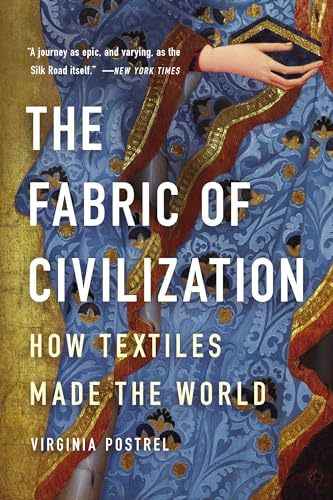
The Fabric of Civilization: How Textiles Made the World
In "The Fabric of Civilization," Virginia Postrel explores how the history of textiles is akin to the story of civilization as we know it. As evidenced throughout her book, Postrel treats each chapter as a standalone story of its production and journey, all the while masterfully weaving it together to show the story of human ingenuity. While academic in nature due to its incredibly well-researched methodology, the general reader will enjoy the book's unique style and approach to world history.
In The Fabric of Civilization: How Textiles Made the World, Virginia Postrel expertly demonstrates how the history of textiles is the story of human progress. Although textiles have shaped society in many ways, their central role in the development of technology and impact on socio-economics have been exceedingly overlooked. Attempting to remedy this issue, Postrel organizes her book into two distinct sections: one focusing on the different stages of textile production (fiber, thread, cloth, and dye) and the other on the consumers, traders, and future innovators of said textiles. To strengthen her argument, Postrel pulls from different primary sources across many regions and cultures, such as the works of people like entomologist Agostino Bassi and the accounts of disgruntled Assyrian merchants. However, Postrel goes beyond relying solely on books and peer-reviewed articles; she personally interviewed textile historians, scientists, businesspeople, and artisans who offered their own insight regarding the importance of textiles in the world. To help the reader envision the intricacies of textile manufacturing, the book is riddled with images that range from ancient spindle whorls and Andean textile patterns to nineteenth-century pamphlets raging over improved cotton seeds. It is quite a laborious task to explain the history of textiles, but Postrel’s way of organizing her chapters and style of writing does an excellent job of conveying her argument.
In Chapter One, Postrel illustrates the many uses of fibers and how their multipurpose functionality served its role in world economies. From the domestication of cotton in the Americas to sericulture in ancient China, such fibers left an indelible mark on trade and technology. Chapter Two looks at the use of thread's connection with social and gender roles as Postrel argues that dismissing fabric as feminine domesticity ignores its integral role in the social innovations that products like clothing and sails provided. Chapter Three connects mathematics with weaving through handwoven textiles by Andean artisans and in the notations written down in Marx Ziegler’s manual, The Weaver’s Art and Tie-Up Book (1677). Chapter Four explains how dyes not only contributed to the distinction between social classes, such as the use of Tyrian purple by Roman emperors but also the ingenuity of humans to ascribe meaning and beauty to a variety of colors. Furthermore, the increasing and competitive trading of dyes in the 16th and 17th centuries would eventually contribute to the discovery of synthetic dyes.
Textile traders and consumers also helped to foster cultural exchanges. Postrel then highlights how traders often also served as innovators. The implementation of the Fibonacci sequence in European trading not only helped traders with bookkeeping but also gave a new perspective to the practicality of learning math by helping traders understand profits and calculate prices. Readers explore in Chapter Six how the Mongol Empire expanded across many different lands for their desire for valuable woven textiles. Under the Pax Mongolica, the textile trade flourished as the Mongols protected the Silk Road, resulting in cross-cultural and technological exchange between Europe and Asia. Lastly, in Chapter Seven, Postrel introduces synthetic polymers like nylon and polyester, where the efforts made by scientists like Wallace Carothers, Rex Whinfield, and James Dickson have revolutionized the use of textiles. Companies like Under Armour use polyester to create water-repellent clothing. Despite synthetic polymers currently being used innovatively, many still seek to look into the future of textiles. As Postrel explains, imagine your pockets can charge your phone or your hat could give you directions. The future of textiles is incredibly exciting.
As an avid writer of socio-economics, Postrel expertly showcases her knowledge of the subject. Postrel’s previous books, such as The Future and its Enemies (1998) and The Power of Glamour: Longing and the Art of Visual Persuasion (2013), cover the interconnectedness between culture, technology, and the economy. Postrel has also worked as a columnist for several news sites, is the contributing editor for the magazine Works in Progress, and was a visiting fellow at the Smith Institute for Political Economy and Philosophy at Chapman University. This book is a wonderful intellectual contribution that feels like a documentary series, perfectly threading the reader through cultures and regions like a needle through fabric.
Continue reading...
93 notes
·
View notes
Text
Rutter
A rutter is a manual for sailors with written sailing instructions. Prior to the advent of nautical charts, rutters were the most important source of geographical information for sailing.
In ancient times, they were known as periplus ("book of circumnavigation") and among medieval Italian sailors in the Mediterranean as portolano ("harbour book"). The Portuguese sailors of the 16th century called it roteiro, the French routier, from which the English word "rutter" is derived. In Dutch it was called leeskarte, in German Seebuch and in Spanish derrotero.



Great Rutter, London: Printed by W.G. for Wil. Fisher at the Postern-Gate near Tower-Hill, and Benj. Hurlock over against St. Magnus Church near London-Bridge, 1671
As you can see, these books have been around since ancient times (4th century BC) to help sailors and mariners on their journeys from A to B. And these manuals often contained a wealth of information that went beyond sailing instructions. They often contained detailed physical descriptions of coasts, harbours, islands, canals, indications of tides, landmarks, reefs, shoals and difficult entrances, instructions on how to use navigational instruments to determine position and plan routes, calendars, astronomical tables, mathematical tables and calculation rules (especially the Marteloio rule), lists of customs regulations in various ports, medical prescriptions, instructions on ship repairs, etc.
The nautical chart, which emerged in the 14th century, therefore never completely replaced the manual, but was only a supplement to it.
If you would like to see more rutters, you can do so here - https://www.aseaofbooks.org
#naval history#rutters#navigation books#4th century bc- 18th century#ancient seafaring#age of discovery#age of sail#naval navigation
190 notes
·
View notes
Text
Fake it till you Make it | Part 21
Eddie wouldn’t necessarily call himself poor. Yes. He lived in a trailer park. But he wouldn’t necessarily call himself poor. He had money, he made bank on being weird for the women of Hawkins, he’d made an easy quick buck dealing back in his high school years, and he had many marketable skills that could get him some kind of menial labour kind of job.
Barback, auto repair, retail, manual labour, and of course, music among the few.
So he was never really poor enough to see moths fly from his wallet in place of cash, never poor enough to miss meals on purpose to save money, or to worry about where his next meal was going to come from while hunger gnawed at his gut.
But being able to just. Walk through a supermarket, without having to look at the price of things before putting them into the cart?
That was a level of financial security that he’d not yet attained, and yet there he was. After being given a second cart for himself, and being assured that he could get anything he thought he and Steve might want while John would grab things for himself and Lynda in his own cart, he was set loose with the simple instruction to meet at the checkouts, John would wait for him if he ended up there first and vice versa.
Eddie didn’t think he’d be finishing first though. There were options. He had options. He didn’t have to look at prices, he didn’t have to grab the cheapest things on the shelf, or look for things reduced in price cause they were about to expire.
He didn’t even have to do mental mathematics for taxes because it didn’t matter!
The only thing he had to worry about, the only thing that made Eddie completely certain in the fact that he’d be making John wait for him at the checkouts, was figuring out what Steve might want to eat without making it way too obvious that he didn’t actually know Steve all that well at all.
He was really starting to wish that he’d just sided with Steve about the pizza.

Okay so, contrary to popular belief given his whole. Keg King persona back in high school. Steve Harrington… couldn’t hold his drink.
At least not anymore. He couldn’t even do a hand stand anymore.
Before, he’d been a killer at it, he could drink and drink and drink, he was like a fish with it, king of the drinking games, lording it over the popular crowd as if it were something to actually be proud of, as if it were a genuine accomplishment to be able to out drink your peers.
But he didn’t drink anymore. At least not nearly as often as he used to.
Alcohol was expensive, and he worked minimum wage.
The most he could do was a six pack from the gas station that he and Robin would split out on a picnic blanket in his back yard, staring up at the sky with nothing but the glow of the pool lights to dim the stars above, laughing about their failed conquests and making plans neither of them could really afford to see through.
Back to the point, Steve, and Lynda Harrington, had found ol Mags’ stash of cheaper reds.
Not quite the big bucks bottles lining the shelves of the wine cellar which Steve, despite them being his now thank you very much grandparents and their ridiculously generous will, wouldn’t touch, but definitely heavy hitting enough to lighten any terrible lows that may have lingered after their earlier spat.
Which led them to their current predicament. Laying on the rug in the living room in front of a crackling fireplace, two glasses of wine between them, and two half empty bottles.
One each of course, they weren’t going to share just one, what were they? Poor?
Steve, feeling curious about a thing that’d come up once as a small, throwaway thought, now the only thing he could think about as he stared at the wooden beams that made up the ceiling and having zero inhibitions stopping him from asking it, so he asked, “How come you never brought up Robin?”
“Hm?” His mother turned to him, cheeks flushed a warm pink, she never could hold her alcohol, he’d gotten that skill from his dad, however fleeting his use of it had been. “Your friend?”
“Yeah, Robbie’s great, why’d you never… why’d you never try’n set me up with Robbie, wh’ts wrong with Robbie?” He didn’t think she meant to laugh quite as condescendingly as she had, but it definitely sounded like that as she burst out laughing. “Tried every girl but Robbie—s’not funny!”
“Oh, sweetheart, my little baby boy, Eddie… Eddie is lovely. You’re not… not thinking of leaving him for Robin are you?” That slight infliction on her name, what was wrong with Robin?! And then— “B’cause, cause… Jesus—baby, sweetie, you’re not— she’s not—it’s not… hm.” She looked at her almost empty glass as if it’d offended her, then placed it down to look at him again “It’s s’not my place… if you don’t know, s’not my place to tell you!”
“What do you know?” He pushed himself up onto his rear, shaking his head for a moment to clear up the spinny feeling that followed him moving “I—I know everything, Robbie tells me everythin but you… you don’t—what do you know about Robbie?”
“Pfft, sweetheart if you want a chance with Robin then, I’m sorry you’re definitely not aware of everything and that’s surprising, does she know you’re… you know… safe? To talk to I mean? You seemed so close I thought she’d have told you!” Granted, half of the words she was saying were slurred, but not slurred enough that he couldn’t make them out, and they were ringing all the alarm bells his brain could possibly conjure.
What did his mother know, and how had she found it out? “I don’t, I just—I was just wondering why you never—I thought maybe you didn’t think she cut it or something stupid, she’s told me everythin but that doesn’t explain why you know… or what you know, what do you know?”
And now his mother was up, sitting up straight doing the exact same thing as him, shaking off that little spinny spin the world decided to do as she sat up too fast. “Robin is perfect, Steven. Truly a one of a kind, kind of young woman.” The slurring had reduced the more serious she’d become, as if the alcohol couldn’t quite touch the severity of what they were now talking about “she also doodles quite obscene things on her shoes. I saw them in the rack not the last time we were home, the time before it? When she stayed the night? Those ratty old canvas things she wore covered in marker scribbles… most young ladies don't doodle breasts on their shoes, and they certainly don’t write about going 'down' on someone’s sister… I… figured it out. I also know that this isn’t something we should be talking about without her being aware of it.” Or at all, really.
She was right. As usual, his mother was right, he even knew she was right about the pizza, he always broke out a little after Tony’s, a few spots would always appear around his mouth that’d drive him insane, so he knew she was right about the groceries too, but yet…
It was so hard to admit that she was right.
“She uh… she was talking about what you guys were doin before we came out here y’know?” But if his mother knew about Robin then… maybe it wasn’t bad to talk about it. His mom regarded him with a curious expression but didn’t ask him to elaborate, didn’t stop him from elaborating either though “the matchmaking thing? I was complaining about it, cause… y’know… I had someone already” no he didn’t, but the excuse of ‘they all sucked’ probably wouldn’t go down very well. “And she said she wished you’d try setting her up with someone…” it was probably a joke but then…
Robin had been struggling.
The uncertainty in approaching queer dating in a small town like Hawkins was… scary. It was terrifying. They were only getting older, there’d only be so many more chances to experience things and trying to experience things later in life while being a big ol bundle of inexperienced anxiety?
Not fun, Steve didn’t want that for Robin. He wanted her to experience things. To be confident in herself because he loved her. He wanted nice things for her. And nice things involved kissing pretty ladies.
“Really?” Oh that little lightbulb, the devious little twinkle in her eyes, her passion reignited, aimed at a much more deserving and probably receptive target “Oh! Sweetie she should have said, second we get home, give her my personal number, okay? It’s up to her to call me but I would— I have a rolodex of names, an it’ll only the best for—for Robin.” Lynda would find that girl a hot sugar mama even if it killed her.
“You’d do that for her?” Steve put a hand to his chest, touched in a way he couldn’t really describe.
“Oh sweetheart, of course I’d do that for her, she makes you so happy, you just… you light up whenever you’re around her an I know it’s not cause you’re dating her because, unless there’s another conversation we need to be having, you’re really not her type. I know she makes you happy. And I know—I know I don’t say it very often—” her voice was wibbling, and oh boy if she was going to cry, then he’d start crying and they’d be a mess “but I’d—" her voice cracked, oh no “I’d move mountains for—for anything—anyone that makes you happy, sweetheart.”
And that was how Eddie and John found them ten minutes later after shaking the snow from their bodies, grocery bags in hand. The mother and son duo bawling together on the carpet, two bottles into the reds, wondering a very simple “what the fuck...?” voiced by a very confused Eddie.
#PirateWrites#FakeItTillYouMakeItFiclet#Steddie#No Upside Down AU#Fake Dating AU#Robbies gonna get HOOKED UP when they get home#i promise
205 notes
·
View notes
Text
So in yet another edition of "mandy hacks together an overcomplicated solution to what should be a fairly easy problem in an art project"
i needed to do a simple animation where a color gradually changes to a different color and it has to happen across 9 frames.
Simple enough right? This is the type of "challenge" that has been figured out since basically the bronze age. Well, i seem to have misplaced that knowledge somewhere between the invasion of the sea peoples and the burning of alexandria. I had no idea how to do it.
First response that comes to mind is to do it in premiere. Surely there is a very basic tool for that, some preset effect that is just a matter of dragging and dropping on the timeline and play around with some keyframes or whatever.
Well first of all i dont trust premiere like that. There is a very specific area that i want to apply the effect to and playing around with chroma has left me very dissilutioned when it comes to premieres capacity to select one specific color to be affected, so no thanks. Also i just dont feel like googling some janky ass tutorial that takes five minutes of video to explain something that only takes ten seconds to say.
So its going to have to be the old fashioned way. The manual way, the frame by frame way. It will fall to me to pick 9 different tones that are the perfect intermediaries between the two colors i want to transition between.
Problem is how can i make sure to choose the precise 9 tones i need with the fiddly little color picker offered by clip studio and the shaky precision of my mouse and my eyes?
Thats when i remembered that colors are actually math. I just have to look at the rgb values of both colors and calculate mathematically the nine equidistant positions from one set of values to the other.
Easy peasy right
Problem is each rgb value is three numbers, and at nine values per number i have to calculate 27 numbers, and then i have to do that three more times because in my infinite wisdom i decided this animation neede 4 color transotions for a total of 108 numbers i have to calculate.
Bjt then i remembered im not just am artist, im also a Nerd! So who came to my rescue in my time of need?

who else could it be?
So i just had to do a very simple formula:
Cell with starting rgb number = A
Cell with target rgb number = B
A+(((B-A)/10)*1)
(The 1 there increases with every subsequent cell)
And then voila!
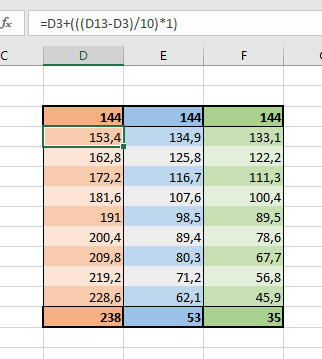
Then is just a matter of entering it frame by frame on the color picker...

And done.
Youll be able to see the results in a couple of weeks
34 notes
·
View notes
Note
hi! :3 do you happen to know of any application/cross-discipline work (if that is the right term) between fiber arts (incl manuals, etc) like knitting and knot theory? it seems like there's an obvious bridge, but i dont really know enough abt either to go digging myself
Oo nice one, I admit I haven't thought about that myself.
For the uninitiated: knot theory is about knots in strings which have connected ends, and about when they are "equivalent" (i.e. whether you can form one into the other without using scissors or passing the string through itself).
When you're knitting, there's all of these different stitches you can do. You could see that as some kind of code (and those knitting guides really look like complicated code to me (I don't knit) (this post is a collab between me and my mom) (everyone say hi to my mom)) where every codeword/stitch gives the material different properties like stretch, rigidity or thickness.
Apparently, researches around the world are working on understanding those stitches using knot theory. Because if they manage to understand knitting, that will both lead to a mega-breakthrough in pure mathematics, and they might be able to use it for micro-materials! That's pretty cool I think :)
As an aside, since knitting consists of only a few actions you can do in different orders, and since every action is reversable, you get some sort of algebraic structure out of it :3 which is also pretty neat.
142 notes
·
View notes
Text
Steam NextFest Impressions - June 2025
Having recently finished Clair Obscure and completing the first major task of Blue Prince, I was floundering a bit on what to play on my PC when my hands finally get tired of holding the Switch (perhaps the least ergonomic console of all time) during Fantasy Life i sessions. NextFest's overwhelming bounty of demos provided me an opportunity to satiate my restlessness without needing to get too invested in anything. So I figured, hey, it's been quite a while since I've written something on my blog, why not get all these demo opinions off my chest? Maybe it'll even be helpful to someone.
Pompeii: The Legacy

Here's a fact about me that I feel like doesn't come up that often: I'm a sucker for city builders. Thankfully for me, it seems like we've been in a bit of a renaissance for these styles of games for the past few years, with both big developers and indies taking stabs at the genre from all sorts of aesthetic directions. I admit to having a bit of a bias towards historical ones, though, so I had to give Pompeii a shot. Given the very limited scope of the demo, it's a little hard for me to tell whether this one has the sauce or not (the true nature of a city builder doesn't tend to reveal itself until you've at least reached the specific complexities of the mid-game), but I did enjoy what I saw. The opening portions have a similar vibe to an Anno without being quite as logistically or mathematically demanding. It's also got story events that pop up from time to time to give you very light roleplaying (or min-maxing) opportunities, which seems to be something a lot of 4X and city/colony builders are doing these days. I know some enthusiasts don't particularly like them (looking at you, every popular Civ 7 Youtuber); but I'm a filthy casual, so I find them a nice change of pace even if the implementation is pretty basic.
It seems like disaster management will be a pretty important consideration in the full game, but none of that reared its head in the demo. Definitely one to keep an eye on to see how it shakes out once it's actually released.
Town To City

Might as well get the other city builder out of the way. This one actually gives you a pretty solid chunk of time; and even once you reach the "end," you can still keep playing and building. You just can't progress further up the development tiers. I adored this game. Unlike most city builders I've encountered, TTC puts a much larger emphasis on spatial puzzle solving rather than strict management of production chains. Fulfilling citizen desires with specific building types to increase happiness does still exist here, but in a much more simplified form. To satisfy food needs, just plop down a fruit stall and fish stall. No need to also put down a farm and harbor and then optimize the output of each one. Instead, you need to manage your use of space: distribute your shops and warehouses so that your entire populace has easy access to things they want, build housing dense enough to provide sufficient labor for those shops and services, but don't build so dense that you don't leave yourself any space for other needs.
Aesthetic considerations are very important in this game. It has no grid, and you're encouraged to plop buildings down in more organic, freeform arrangements. The road building tool is literally a paintbrush, which I think communicates this game's priorities perfectly. My favorite part, though, is how decorations work. Much like in real life, your populace is happier when their workplace, housing, and commute have features that are pretty to look at. It's vital to fill in the spaces between your houses, shops, and walkways with all sorts of little decorations: streetlights, flower pots, wells, arches, bushes, trees, etc. There are a lot of options, and many of them have different colors and varieties you can either manually select or have the game randomize for you on placement. You can even place some of these decorations directly on your existing structures: streetlights turn into wall-mounted lamps or lanterns floating in a fountain, and flower pots and bushes turn into windowsill planters. This gridless, modular system makes it so much easier and more fun to customize and beautify your little town. The game even comes with a photo mode to let you capture your town from any angle you want (I used one of my own photos for the screenshot before this writeup). It really is a delightful, relaxing, and only moderately-puzzly game. The most no-brainer wishlist addition for me.
Date Everything

Oof.
So despite this game appearing like your typical farcical dating sim, I wanted to give it a fair shot. On my first playthrough, I left with mixed feelings but still felt tentatively optimistic. Sure, some of the humor did not land all that well and was trying way too hard, but there were at least a couple characters I enjoyed (Betty the Bed and Mac the Computer) and one I thought was fine but had promise (the piano whose name I can't recall off the top of my head).
It turns out I just got very lucky with my choices.
When I replayed the game on a date with Fabby and let her make nearly all of the decisions, we both left feeling largely negative and wary. Fabby being Fabby, she spent most of the second day (the first day where you can choose to talk with anything in the house) in the bathroom. The writing for these characters was pretty dire. The toilet character's gimmick (a white rapper with an extremely overdone French accent) was so surprising and weird that it kinda wrapped back around to being a little charming, but the shower, mirror and towel just did not have anything interesting going on. You'd think these characters would provide at least some fun interplay and/or kink given how closely they're linked to intimate, seemingly private activities, but their introductory scenes did not have any interest at all in exploring any of that. The shower was especially egregious, as he spent most of his scene complaining about being stuck in the bathroom and finding his job extremely dull (while shifting inexplicably between an Elvis and Johnny Cash impersonation). Betty the Bed does engage in intimacy and kink, so this seemed to just be a result of specific writing choices made for those characters rather than any game-wide content restrictions. Fabby's comments summed up my disappointment with the writing quite well: "This shower should be happy to see me naked every day." The whole situation wasn't improved by a noticeable lack of gender variety in the bathroom characters (everybody we found used he/him pronouns) and misgendering language used by at least two of them (to the point where I would have wondered if I had accidentally chosen the wrong pronouns at the start if it weren't for the opening sequence clearly referring to our avatar with she/her pronouns). We also noticed a trend of non-white characters sometimes being put in stereotyped roles and outfits. It happened just frequently enough to give both of us some weird vibes.
So yeah! I left that second playthrough feeling pretty disappointed with the game. It leans way too heavily on comedy for how unfunny most of the writing is, and it seems weirdly averse to being kinky and horny. I think I would have liked it if it was either more sincere or more perverse. Ideally both.
Dispatch

I was genuinely floored by this demo. It's a superhero workplace comedy made by former Telltale folks that blends a simple management simulator with the now-ubiquitous timed dialogue choices. The animated sequences look gorgeous, the writing is snappy and clever, and the actual dispatching portion of the game is surprisingly engaging. I love how you're given a brief description of what traits might be important for a mission and have to spend a brief moment agonizing over which of your Z-listers might pull it off. And how sometimes the one you know would knock it out of the park is already busy doing some other mission. When you succeed you feel like a genius, and when you fail you can't help but laugh. It rules! One of the few games I'm absolutely going to buy the moment it releases.
Azaran: Islands of the Jinn

Hey, you know how Nintendo hasn't made a "traditional" 3D Zelda game in 14 years? Benji decided to just make their own, and God bless them for it. I don't have much to say about it, since the demo is just a small slice of what I assume is the very first dungeon, but it does a great job of nailing the aesthetic and dungeon design. As someone who tends to replay Ocarina of Time and Twilight Princess at least once a year, I'm very happy this exists.
Crescent County

You are a delivery witch who rides a broom (that's basically a motorcycle with glide capabilities) through a pastoral, pastel island. The primary mood the demo seemed to be trying to hit was "chill." Even the races were chill. The delivery portions didn't have time limits; and while "optimal" routes exist, you can pretty much drive wherever. It was fun enough, but I'm not sure how well what seems to be the core loop will hold up in the full game.
Eriksholm: The Stolen Dream

I feel like it's been ages since I've seen an isometric stealth game, and I'm so goddamn happy I found this one. I do love me some first-person stealth (Thief, Dishonored) and third-person stealth (Splinter Cell, Hitman), but there's something really special about the birds-eye, isometric implementation. I love how blatantly puzzle-y it is. You're given essentially perfect knowledge of enemy placement and routes. Then the game stares out you and demands you take it all in and figure it out. It's not trying to trick you. That would be gauche. It just wants to see those gears turn in your brain.
Eriksholm's demo gives you longer to play than I figured it would, and I loved every second of it. Just barely threading the needle between two guards feels so fucking good.
Undusted: Letters from the Past

A woman restores mementos from her childhood as she remembers her complicated relationship with her parents. It's the kind of game I'm a sucker for, and it itches the same part of my brain that Powerwash Simulator did. Just in smaller, bite-size portions. Of course the story is clearly going to be much more important for this game than it was for Powerwash, and the writing seems pretty solid so far, though it's not something that can truly be evaluated from just the short snippet the demo offers. I'm intrigued, though!
AEROMACHINA

I really wanted to like this game more than I did. It's got a killer art design and a compelling premise (you're a cyborg furry who's part fighter jet and you do 3D platforming), but the implementation was just a bit too frustrating and awkward for me. The nadir of the demo was very early on where it tries to teach you how to do a long-jump into a glide and does and absolutely piss-poor job of it. If it weren't for a Steam discussion thread where multiple people expressed their own frustrations and one kind soul perfectly communicated the specific button-press timing the game is looking for, I truly don't think I would have made it past that room. Even when I finally knew what to do and could do the long-jump glides consistently, it still felt kinda bad and awkward. Psuedoregalia this is not.
I feel the real test of how much you care about a game will reveal itself in how willing you are to redo lost progress as a result of an unfortunate save situation (whether it be the game's fault or your own). In my case, I got into a boss fight without realizing just how difficult it was going to be, died, and then went back to the last time I passed a save point. Because this game doesn't have checkpoints or auto-saves. I realized I'd have to redo, like, 15 minutes of progress and decided I just didn't care that much about seeing the end of the demo.
I had seen enough.
#nextfest#pompeii: the legacy#town to city#crescent county#date everything#aeromachina#eriksholm: the stolen dream#undusted: letters from the past#azaran: islands of the jinn#i truly was gaming last week
12 notes
·
View notes
Text
The Litchi Road ( 长安的荔枝 /Chang An De Li Zhi ) Some meta!
Fish Tally (魚符 yúfú)
A variant of the Tiger Tally (虎符 hǔfú), which we often see in period dramas. Read here.

婆婆纳 Veronica
Veronica is a herb that has detoxifying properties and can reduce swelling.
The long nails of Minster of Right
Long nails represent not doing manual labor, a symbol of status.
Tang dynasty men liked to be well-groomed
They considered beards beautiful and paid attention to its maintenance.



Is Ming Suan Ke (明算科) the same as mathematics?
One of the six types of imperial examinations in the Tang Dynasty, but Tang Dynasty emphasized literature over science, and those who passed the examination could only become minor officials.
What is an Agent (掮客 Qianke)?
Being a middleman between two parties.
What hexagram (卦 gua) did Taoist Master Changyuan draw?
The upper part is Kan, and the lower part is Zhen, which is a Tun hexagram 屯卦 (Water Over Thunder 水雷屯).
"There are dangers everywhere, but there is still hope." (险象丛生但也生机尚存).





.
The Litchi Road (长安的荔枝 / Chang An De Li Zhi) Masterpost
12 notes
·
View notes